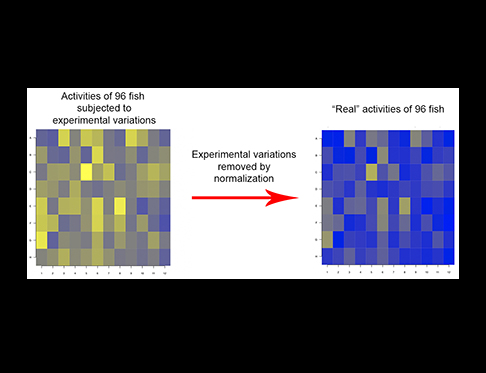Making sense of large-scale behavioural data for eye-drug discovery
03-12-2019

Making sense of large-scale behavioural data for eye-drug discovery
Leung lab focuses on finding new drugs for retinal degeneration with zebrafish research. We treat many retinal-degeneration larvae with different drug compounds and evaluate how these drugs may improve the visual performance of larvae. During this process, we collected large-scale behavioural data from many individuals and many conditions. Such data are affected by many systematic variations. For example, the larvae may display slightly different behavioural outputs due to receiving uneven light stimulation (Left Figure). These variations may make it harder to identify a drug for that can treat retinal degeneration. To tackle these variations, we worked with Rui Xie and Dr. Ping Ma from the Department of Statistics at the University of Georgia to establish a framework to normalize large-scale behavioural data collected from many individual animals. Our normalization approach can effectively remove unwanted variations from the collected data (Right Figure), and unveil the real activity patterns of the tested larvae. This analysis tool would greatly facilitate our discovery of new drugs for retinal degeneration.
Several students in the Leung lab contributed to the study, including graduate student Prahatha Venkatraman, and undergraduate students Robert Carmer and Gaonan Zhang.
Reference:
Xie R, Zhang M, Venkatraman P, Zhang X, Zhang G, Carmer R, Kantola SA, Pang CP, Ma P, Zhang M, Zhong W, Leung YF. Normalization of large-scale behavioural data collected from zebrafish. PLOS ONE. 2019 Feb 15;14(2):e0212234.